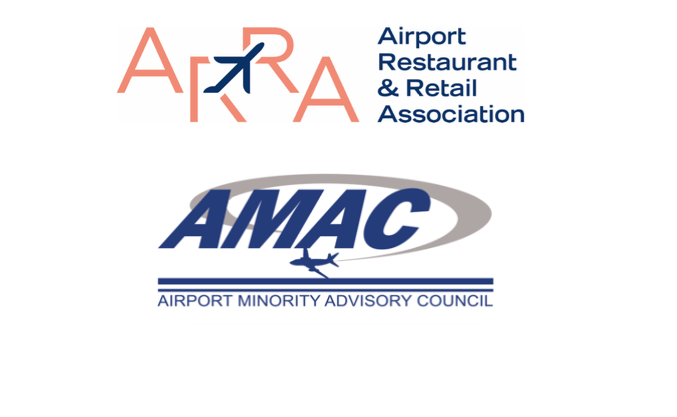The massive disruption in aviation caused by the COVID-19 pandemic has prompted concessionaire trade groups to seek relief in an effort to stem financial losses.
The Airport Restaurant & Retail Association (ARRA) and the Airport Minority Advisory Council (AMAC) are urging both airports and the U.S. Congress to act.
Patrick Murray, president of the ARRA Board and executive vice president of SSP America, paints a dire picture of the concessions industry as the crisis deepens.
“Things are literally changing by the hour,” he says. “As of last Thursday [March 12], the business had lost about one-third of its sales – and I’m generalizing with the various components of our business: duty free, retail, and food and beverage. By Sunday [the losses] had grown to about 50 percent, and by yesterday we had lost another 5-8 percent of the business.
“You’re essentially looking at the airport business channel that we have coming to an almost grinding halt, with us losing 80 percent, 90 percent or perhaps all the sales for some period of time, plus not knowing what’s in front of us.”
John Clark, chair of AMAC, also notes the dire sales losses, adding, “The industry is facing a major financial crisis. Many businesses, including those classified as small and/or disadvantaged, may not be able to continue operations.”
Clark told AXN that many AMAC members have their personal finances directly tied to their businesses. “Many [ACDBEs and small businesses] have leveraged their mortgages, et cetera, to invest capital in the airports,” Clark says. “They depend on the revenue stream to meet not only their payroll but their bond covenants as well.”
ARRA and AMAC represent a $10 billion industry made up of firms of varying sizes, including many small and local businesses, which contribute $2.5 billion to airport revenue streams. Together these businesses employ more than 125,000 workers in U.S. airports.
The associations together are asking for relief from both airports and the federal government. The groups are asking airports to:
• Waive rent, other fees and the imposition of penalties for at least six months with the opportunity to extend depending on the extent and impact of the crisis.
• Suspend and defer concessionaires’ capital investment requirements.
• Provide operational flexibility including, but not limited to adjustments to operating hours, locations and menus/product selections as well as selective temporary closing of stores and restaurants in order to better align with passenger volumes and flows and reduce the impact on employees.ARRA and AMAC acknowledge that many airports have worked individually with concessionaires to alter lease terms and other requirements.
“Many of our airport partners have tried on their own to come to our support and defense,” Murray says, noting several instances of elimination of the minimum annual guarantee, alteration of operating hours and other efforts. “There is a lot of communication that has to go on. We’re just asking that everyone work overtime on this.”
He also stresses that ARRA and AMAC are supportive of airports in their efforts to obtain relief from the federal government.
Concessionaires are also turning to the federal government. ARRA and AMAC are urging Congress and the Trump Administration to provide financial relief and assistance to airport concessionaires to help them continue operations, secure loans, and make debt service payments.
They are asking that the government:
• Provide grants and low-interest or interest-free loans to concessionaires to allow concessionaires to cover operating expenses.
• Provide loan guarantees to concessionaires to assure their ability to continue making debt service payments and secure loans for their ongoing capital investment requirements.
“We want to get a strong message out to the airports, to urge them and to urge our members to get together to work out some arrangements. Many already are, and that’s where it has to start first,” says Rob Wigington, executive director of ARRA.
“We also need to send a strong message to Congress,” Wigington adds. “We want to be clear that we support the airports in what they’re asking from Congress. That will help not only the airports but it will [ultimately] help the concessionaires…. But it won’t be enough. This package that Congress is putting together can’t just be bailing out the airlines and helping the airports, as important as that is. It’s got to include something for concessionaires, particularly the smaller businesses.”
In addition to the specific actions ARRA and AMAC are requesting of airports and the federal government, they also urge airports to put the brakes on capital expenditures.
“Mid-term refurbishments or additional capital expenditures, or projects that are currently on the table for build-out – all of that really needs to come to a halt at a time when we’re literally ringing fewer and fewer sales and potentially heading toward zero,” says Judith Byrd, president of Byrd Retail Group and an ARRA Board member.
Larger projects also warrant reconsideration, according to Murray. “There are new terminals being built and there are efforts to keep those projects moving as much as possible,” he says. Murray suggests the money can be better used in shoring up the business. “We’re in much the same situation as an airline, in that regardless of the size of the company, liquidity is crucial right now. Continuing to build a capital project for a restaurant or retail operation would seem somewhat short-sighted today.”






